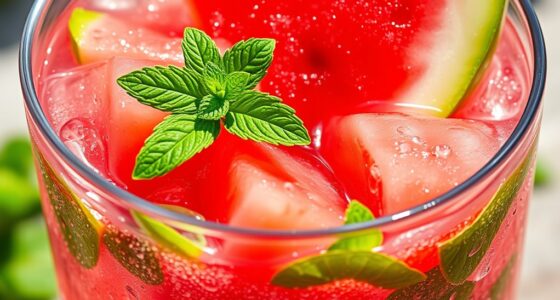To relieve swelling, you should drink 1 to 2 cups (240 to 480 mL) of pineapple juice daily. This amount offers the benefits of bromelain, which helps reduce inflammation. Try consuming the juice about 30 minutes before meals for better digestion. Keep it to 1 cup if you're recovering from surgery to avoid discomfort, and remember to rinse your mouth afterward to protect your teeth. For more insights into pineapple juice's benefits and other remedies, keep reading.
Key Takeaways
- Consume 1 to 2 cups (240 to 480 mL) of pineapple juice daily for optimal bromelain benefits without excessive sugar intake.
- For enhanced digestion and absorption, drink pineapple juice about 30 minutes before meals.
- Limit intake to 1 cup (8 ounces) during post-operative recovery to manage discomfort and prioritize medications.
- Rinse your mouth after drinking to protect teeth from acidity and reduce irritation.
- Consult a healthcare professional if experiencing persistent pain or swelling, or if on certain medications before consuming pineapple juice.
Understanding Pineapple Juice and Its Benefits
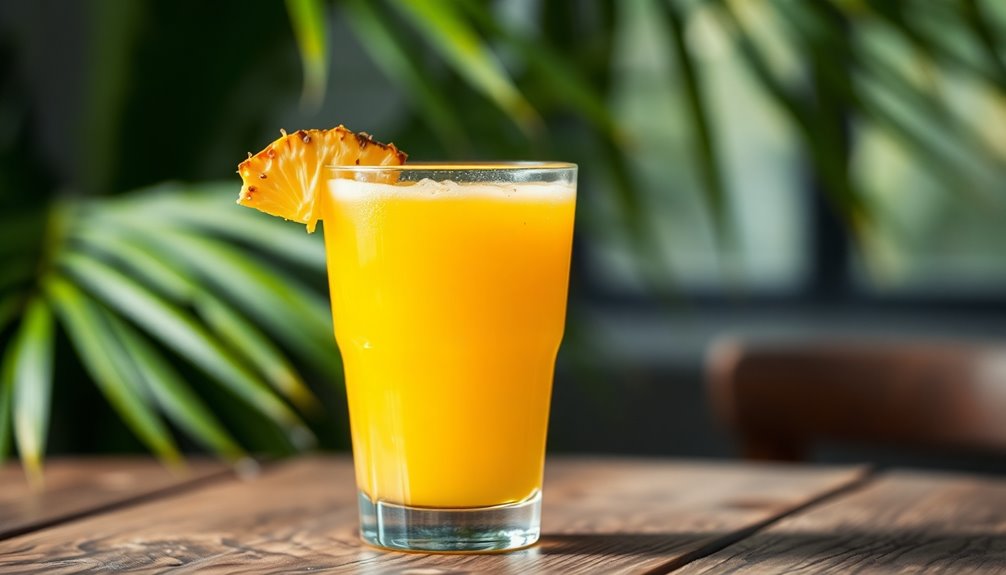
When you're looking for natural ways to reduce swelling, pineapple juice might just be the answer. Packed with vitamin C, this juice supports your healing process and boosts your immune system during recovery.
Pineapple contains bromelain, an enzyme known for its anti-inflammatory properties, which can help reduce swelling and bruising, especially after surgery. With about 133 calories per cup, unsweetened pineapple juice is also rich in essential nutrients like manganese, copper, and vitamin B6.
However, be cautious, as the high acidity can sometimes worsen oral inflammation. So, if you've recently had dental work, enjoy this invigorating juice in moderation to maximize its benefits without discomfort. Additionally, incorporating high vitamin C foods into your diet can further enhance your recovery process.
Pineapple juice can be a tasty ally in your recovery journey!
The Role of Bromelain in Reducing Swelling

Pineapple juice isn't just a rejuvenating drink; it also contains bromelain, an enzyme that plays a significant role in reducing swelling. This enzyme boasts impressive anti-inflammatory properties, making it a potential ally in managing post-surgical pain and swelling.
Studies have shown that bromelain can yield results similar to those of conventional anti-inflammatory medications like diclofenac sodium. While many participants in bromelain studies reported higher initial pain and swelling, the enzyme may aid recovery over time.
It's important to emphasize that most research focuses on bromelain supplements rather than pineapple juice, which leaves a gap in evidence for the juice's effectiveness. If you're considering bromelain for your swelling, consult with a healthcare provider for personalized guidance.
Recommended Dosage of Pineapple Juice for Relief

When considering pineapple juice for relief, it's important to think about daily intake recommendations and the best times to consume it.
You should also be aware of potential health risks associated with excessive consumption.
Balancing these factors will help you enjoy the benefits without negative effects.
Daily Intake Recommendations
For effective relief, you might consider consuming 1 to 2 cups (about 240 to 480 mL) of pineapple juice daily. This amount can help you enjoy the bromelain content while offering nutritional benefits without excessive sugar. Remember, moderation's key; excessive drinking pineapple juice can lead to discomfort and high blood sugar spikes. Individual responses vary, so it's wise to consult your healthcare provider for tailored recommendations.
Here's a quick guide for daily intake recommendations:
| Amount of Juice | Potential Benefits |
|---|---|
| 1 cup (240 mL) | May help reduce pain |
| 2 cups (480 mL) | Increased bromelain content |
| Excessive intake | Risk of digestive discomfort |
| Consultation | Advisable with a healthcare provider |
Timing for Consumption
To maximize the potential benefits of pineapple juice, it's wise to contemplate the timing of your consumption.
While there's no specific dosage for swelling reduction, limiting your intake to about 1 cup (8 ounces) can help manage digestive discomfort and sugar spikes.
Remember, post-operative recovery should prioritize prescribed medications, with pineapple juice serving as a supplementary option.
Consider these tips to enhance your experience:
- Consume pineapple juice about 30 minutes before meals for better digestion.
- Rinse your mouth afterward to protect your teeth from acidity.
- Pair it with meals that include anti-inflammatory foods for optimal benefits.
- Pay attention to how your body responds to the enzymes in pineapple juice.
Stay mindful of your consumption timing for ideal relief!
Potential Health Risks
While enjoying pineapple juice can offer some benefits, it's important to be aware of the potential health risks associated with its consumption. The high sugar content can lead to spikes in blood sugar levels, so moderation is vital. Consuming excessive amounts, like 64 ounces, may cause digestive discomfort and other issues. Additionally, the acidity of pineapple juice can irritate your mouth and potentially worsen swelling, making it important to limit your intake. There isn't a specific recommended dosage for relief, so it's wise to consult a healthcare provider before incorporating pineapple juice into your routine. They can help guarantee that your consumption aligns with your individual health needs and recovery goals. It's also beneficial to consider natural remedies alongside pineapple juice for a holistic approach to managing swelling.
How Pineapple Juice Compares to Other Remedies

Although pineapple juice is often touted for its health benefits, it doesn't measure up to other remedies when it comes to relieving swelling. While it contains bromelain, an enzyme with anti-inflammatory effects, studies show it's less effective than pharmaceutical options like diclofenac sodium for post-surgical pain relief.
You might experience oral discomfort due to its acidity, which can worsen inflammation rather than help.
Consider these alternatives for swelling relief:
- Vitamin K cream: Known for reducing bruising and swelling.
- Arnica: A topical remedy with proven effectiveness.
- Cold compresses: Quick relief for swelling in maxillofacial regions.
- Over-the-counter NSAIDs: Reliable for managing pain and inflammation.
Additionally, being aware of breast cancer symptoms is crucial, as some individuals may experience swelling in the breast area that could indicate a serious condition.
Potential Health Benefits of Pineapple Juice

Pineapple juice packs a punch with its nutrient-rich composition, offering essential vitamins that support your immune system.
Its natural anti-inflammatory properties can help you manage swelling and discomfort effectively.
Plus, the antioxidants in pineapple juice work to protect your body from chronic diseases, making it a great addition to your diet.
Nutrient-Rich Composition
Juicy and revitalizing, pineapple juice boasts a nutrient-rich composition that offers a variety of health benefits. Packed with essential nutrients, it supports your immune function and promotes wound healing thanks to its high vitamin C content. One serving provides about 79% of your daily needs!
- Contains bromelain, which may help reduce swelling and bruising after surgery.
- Provides antioxidants that neutralize free radicals, protecting against oxidative stress.
- Rich in manganese and copper, essential for overall health.
- High potassium content supports heart health by regulating blood pressure.
Incorporating pineapple juice into your diet can be a delicious way to enjoy these health benefits while quenching your thirst. Additionally, maintaining a clean living space can further enhance your overall well-being and support your health goals.
Anti-Inflammatory Properties
When you think about natural remedies for inflammation, pineapple juice often stands out due to its powerful bromelain content. This enzyme is known for its anti-inflammatory properties, helping to reduce swelling and pain, especially after surgery.
A study found that drinking 350 milliliters of pineapple juice twice a day for 14 days greatly improved recovery and reduced postsurgical bruising. Bromelain's effects can be comparable to those of diclofenac, although you might experience more initial pain and swelling.
Additionally, the vitamin C in pineapple juice supports healing, enhancing its anti-inflammatory benefits. While pineapple juice shows promise for inflammation management, more research is needed to determine specific dosages and its overall efficacy.
Immune System Support
With its impressive vitamin C content, pineapple juice can be a delicious way to support your immune system.
This vibrant drink not only boasts antioxidants that help neutralize free radicals but also contains bromelain, which may enhance immune response and aid in recovery from illness.
Regularly sipping on pineapple juice provides essential vitamins and minerals like manganese and copper, vital for maintaining a strong immune system and reducing swelling.
- Boosts your body's defenses
- Helps fight off infections
- Supports recovery from illnesses
- Contributes to a balanced diet
Incorporating pineapple juice into your routine can be an easy and tasty way to enhance your overall immune health!
Risks and Side Effects of Consuming Pineapple Juice
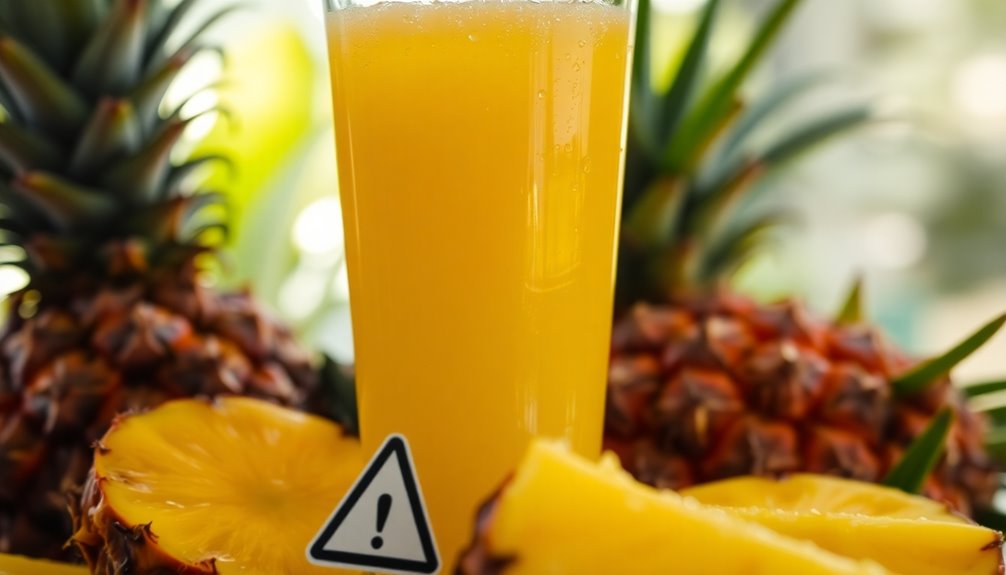
Though pineapple juice is often praised for its health benefits, it's important to be aware of the potential risks and side effects it can bring.
The high acidity of the juice can lead to inflammation in your mouth, especially after dental work. If you consume large amounts, like 64 ounces, you might experience significant spikes in blood sugar levels, which can be harmful if you have diabetes.
Excessive intake can also cause digestive discomfort, including diarrhea and nausea. Additionally, the sugar and acidity may damage your tooth enamel, increasing the risk of cavities.
Finally, some individuals may face allergic reactions, resulting in rashes, hives, or breathing difficulties that require immediate medical attention.
Tips for Incorporating Pineapple Juice Into Your Diet
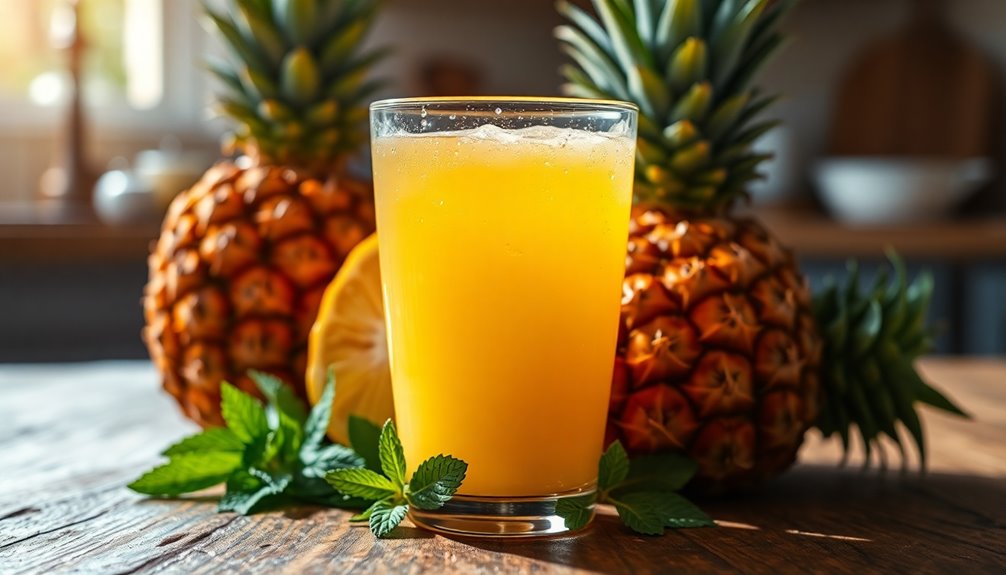
Despite the potential risks and side effects of consuming pineapple juice, you can still enjoy its benefits by incorporating it thoughtfully into your diet. Start with a moderate intake of 1 cup per day to avoid excessive sugar spikes. Choose unsweetened pineapple juice to maximize health benefits like vitamin C and bromelain, which can help reduce swelling.
Here are some tips to make the most of pineapple juice:
- Rinse your mouth with water after drinking to protect your teeth from acidity.
- Blend pineapple juice with other fruits or veggies for extra nutrients.
- Consider bromelain supplements for enhanced anti-inflammatory effects.
- Maintain a balanced diet during your recovery to support overall health.
When to Consult a Healthcare Professional

When should you consider reaching out to a healthcare professional? If you experience persistent pain or excessive swelling that doesn't improve within a few days after surgery, it's essential to consult a healthcare professional for further evaluation.
Look out for signs of infection like fever, chills, or severe swelling around the surgical site. If you notice any symptoms of allergic reactions, such as rashes, hives, or difficulty breathing after drinking pineapple juice, seek immediate medical attention.
Additionally, if you're on medications like blood thinners or antibiotics, consult a healthcare provider before adding bromelain or pineapple juice to your routine due to potential interactions. Safe sleep guidelines are also crucial to consider when caring for newborns to ensure their well-being.
For any unusual or worsening symptoms, including difficulty swallowing or persistent cough, reach out promptly.
Alternatives to Pineapple Juice for Swelling Relief

If you're looking for alternatives to pineapple juice for swelling relief, consider using a cold compress on the affected area. Incorporating anti-inflammatory foods into your diet can also make a difference, along with staying well-hydrated and getting plenty of rest. These simple steps can help you manage swelling effectively. Additionally, balanced diet that includes fruits and vegetables can support your overall health and help reduce inflammation.
Cold Compress Application
Cold compresses are a go-to solution for reducing swelling effectively. When you apply a cold compress, like ice, it constricts blood vessels, decreasing blood flow to the affected area. This is especially beneficial post-surgical or after an injury.
For best results, apply the cold compress for 15-20 minutes several times a day within the first 48 hours.
Here are some easy options for your cold compress application:
- Ice wrapped in a clean towel
- Frozen peas (great for contouring!)
- Commercially available gel packs
- A cold, damp cloth
Anti-Inflammatory Foods
Exploring alternatives to pineapple juice for swelling relief can lead you to a variety of anti-inflammatory foods that pack a powerful punch against inflammation.
Incorporating foods rich in omega-3 fatty acids, like salmon and flaxseeds, can help reduce inflammation and alleviate swelling.
Dark leafy greens such as spinach and kale provide antioxidants that support recovery and combat inflammation effectively.
Berries, including blueberries and strawberries, are high in polyphenols, contributing to swelling reduction.
Don't overlook turmeric; its active compound, curcumin, offers potent anti-inflammatory benefits.
Finally, nuts like walnuts and almonds are packed with healthy fats and antioxidants that can also lower inflammation.
Hydration and Rest
In addition to incorporating anti-inflammatory foods into your diet, staying well-hydrated and getting adequate rest are essential for managing swelling. Proper hydration helps flush out toxins and supports your recovery.
Remember to:
- Drink plenty of water throughout the day.
- Use cold compresses on swollen areas for pain relief.
- Consider saltwater gargles for mouth swelling after dental work.
- Follow prescribed medications to manage pain and inflammation.
Rest is equally important; limiting physical activity allows your body to focus on healing and reduces swelling. Additionally, consuming anti-inflammatory foods can further enhance your body's ability to reduce swelling.
A Summary of Key Takeaways
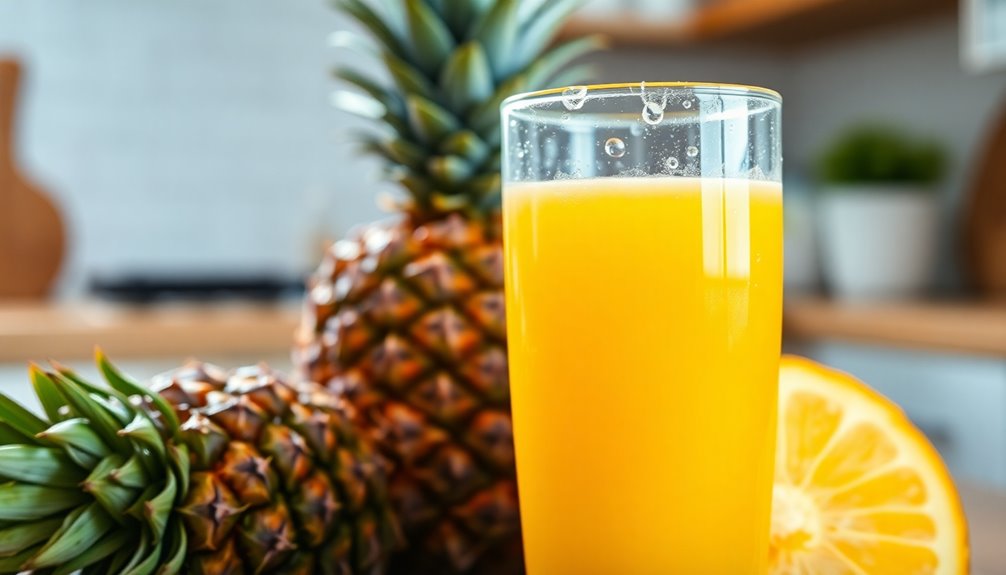
While pineapple juice is often touted for its potential health benefits, its effectiveness in reducing swelling is less clear.
Although it contains bromelain, an enzyme that may help reduce inflammation, most studies focus on concentrated supplements instead of juice. Some research indicates that participants consuming bromelain in juice reported higher pain and swelling than those using diclofenac post-surgery, suggesting limited relief.
Additionally, the juice’s high acidity might trigger mouth inflammation, counteracting any benefits for swelling. A study suggested drinking 350 milliliters twice daily for recovery, but its effectiveness remains uncertain. Moreover, while some people experience positive effects from consuming such juices, the potential drawbacks, like mouth irritation, should not be overlooked. It is essential to balance these drinks with other beneficial dietary practices, such as a daily olive oil and lemon juice intake, which may offer additional anti-inflammatory properties without the adverse effects. Ultimately, consulting with a healthcare professional can help individuals determine the best approach for their specific health needs.
It's important to consult a healthcare provider before using pineapple juice as a remedy, especially if you have specific health conditions or take medications.
Frequently Asked Questions
Does Pineapple Juice Reduce Swelling?
Pineapple juice might help reduce swelling due to its bromelain content, but results vary.
While some studies suggest bromelain can alleviate pain and inflammation, the concentration in juice is much lower than in supplements.
You'll find that pineapple juice offers nutritional benefits like vitamin C, which aids recovery, but it's not a guaranteed solution for swelling.
Just remember to consume it in moderation, as too much can cause digestive issues.
Does the Pineapple Juice Trick Really Work?
You might be curious if the pineapple juice trick really works. While pineapple juice contains bromelain, which has anti-inflammatory properties, there's no solid scientific evidence supporting its effectiveness for pain relief or reducing swelling.
In fact, some studies show no significant difference compared to traditional pain relievers, and the acidity could even worsen inflammation in your mouth. So, you shouldn't rely on pineapple juice as a guaranteed solution for pain management.
Does Pineapple Juice Get Rid of Water Retention?
You might think that just drinking pineapple juice won't do much for water retention, but it can actually help!
The bromelain and potassium in pineapple juice work together to reduce swelling and balance your sodium levels. Plus, the vitamin C supports overall health, making it a tasty way to stay hydrated.
Just remember to enjoy it in moderation; too much juice can lead to digestive discomfort and mightn't give you the relief you're looking for.
What Does Drinking a Gallon of Pineapple Juice Do?
Drinking a gallon of pineapple juice can lead to serious health issues.
You'd consume around 400 grams of sugar, which could spike your blood sugar levels and lead to energy crashes. The high acidity might irritate your mouth and worsen inflammation.
Plus, you could experience digestive discomfort, including diarrhea, from the natural sugars and bromelain.
Conclusion
In the journey toward relief from swelling, think of pineapple juice as a golden key opening nature's healing potential. By embracing its benefits, especially the bromelain, you're inviting a revitalizing ally into your wellness routine. Remember, balance is essential; just as a well-tended garden flourishes, so too can your health thrive with the right approach. So sip wisely, and let the vibrant energy of pineapple juice guide you toward comfort and rejuvenation.
Cindy thoroughly researches juicing trends, techniques, and recipes to provide readers with practical advice and inspiration. Her writing style is accessible, engaging, and designed to make complex concepts easy to understand. Cindy’s dedication to promoting the advantages of juicing shines through her work, empowering readers to make positive changes in their lives through the simple act of juicing.







